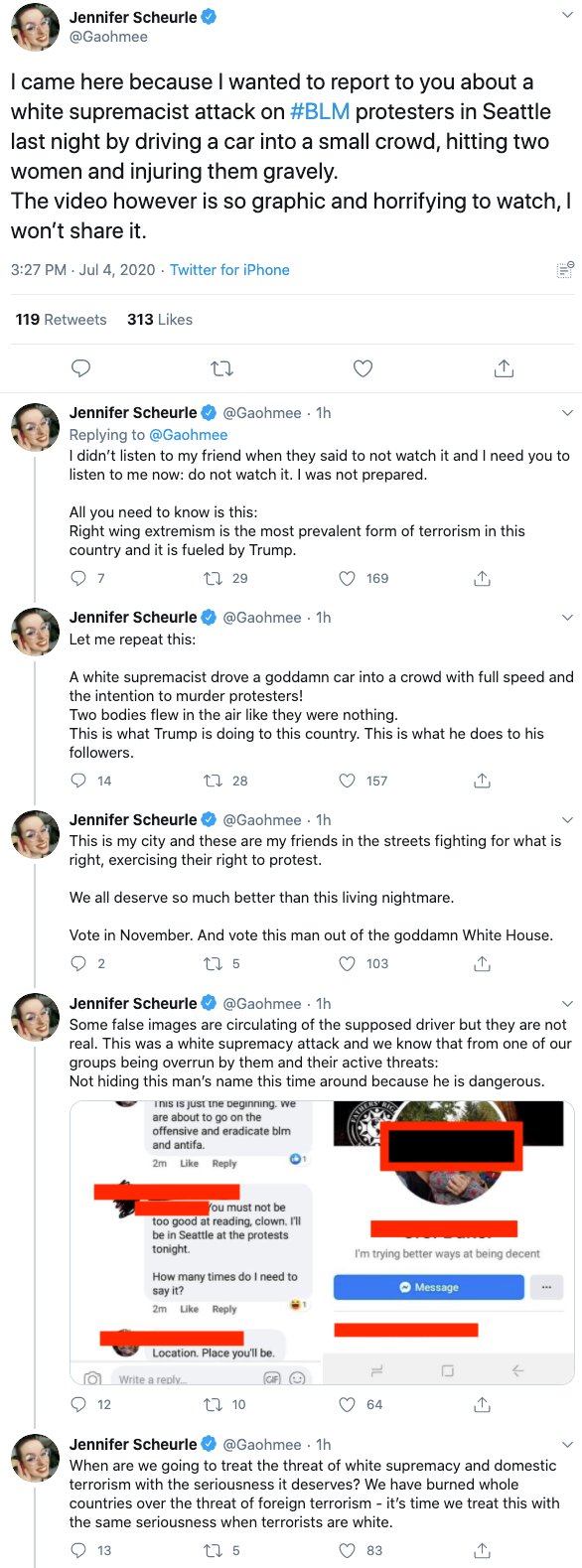
People are feeling comfortable enough to make false allegations online.
When it comes to “regular people,” the internet and social networks have played a historically positive role in democratizing the media scene and giving them a voice (except all those times when centralized giants decide to censor it) – but this communication revolution definitely has a dark underbelly.
First we had fast food and fast fashion, and now we have “fast justice.” Internet vigilantism is another way of putting it. Those practicing it seem to be driven by a feeling that they now have all the power to go against anyone they choose and none of the responsibility that normally comes with making extremely serious accusations, like those of attempted murder fueled by racism.
Online mobs and their instigators are assembling as real-world events and social media feed off of each other in a tsunami of chaotic energy rising in the context of political unrest and violence in the US. And as instigators are known to do, they give little to no thought to the possibility that the wrong person might be their target.
Twitter doesn’t require any proof, either, and doesn’t seem to be taking any action – and it is within that ecosystem that this just happened.

In the most recent case, Jennifer Scheurle (@gaohmee), a game designer at Arenanet decided she wanted to “report” on July 4 that “a white supremacist attack” happened against a Black Lives Matter rally in Seattle, when a man drove his car into “a small crowd” with “the intention to murder protesters.”
According to her, two people were seriously injured, (one has since been confirmed dead) and she described the incident as deliberate, perpetrated by a white racist, and also managed to work President Trump into the message as being partly responsible for all this.
The accident did happen – and a car did hit protesters that were blocking the freeway – but Scheurle blamed, named, and shamed the wrong person, citing the wrong motivation: what was supposed to be “a white supremacist attack” looks like an incident perpetrated by a black man, Dawit Kelete – The Seattle Times reports.
However, after being accused of being a white supremacist and murderer in a time of mass unrest, the person Scheurle falsely named as the attacker then reacted by telling her to remove the post or face legal action.

Some of his supporters encouraged him on to go ahead with a lawsuit anyway in order to stand up to fervent and unchecked online activism. It’s worth noting that falsely accusing someone of a crime is not protected by the United States’ First Amendment.
And in this case, it would seem like proponents of “cancel culture” are canceling themselves: Scheurle has in the meantime made her Twitter account “protected,” i.e., publicly inaccessible; at the same time she’s already notorious for putting herself into an echo chamber where accusations can go unchallenged, blocking large swathes of accounts, as well those who never interacted with her in any way.
But Twitter hasn’t yet done what spokesperson Katie Rosborough recently told The Baltimore Sun it would so when tweets violate its rules around disclosure of private information or abusive behavior – namely, take “enforcement action.”
Rosborough’s comment came after a retired police officer got falsely accused in early June of confronting three persons distributing protest flyers in the wake of George Floyd’s death.“John Damskey’s nightmare began with his wife getting emails from strangers telling her she should be ashamed of her husband, a retired police officer. Their phones wouldn’t stop ringing with calls from unfamiliar numbers. Some even called his 74-year-old mother.Baffled by the barrage of hate last Thursday, Damskey plugged his name into the internet and made a horrifying discovery: Mobs of Twitter users were falsely accusing him of being the bicyclist on a Maryland trail who accosted three young adults posting flyers protesting the death of George Floyd.”
In reality, John Damskey was uninvolved in the incident that saw him as “one of at least two men” accused and harassed on Twitter, and then in real life, via emails, and phone calls.
The real perpetrator was later arrested – the person who was seen grabbing the flyers and using one of the activists’ bicycle to knock him down in a video with over a million views on Twitter.
Attorney Rene Sandler was quoted as saying that if more false information emerged about the former police officer, action would be taken against those publishing it.
Another recent story details how life quickly turned into hell for 49-year-old Peter Weinberg, who found himself falsely accused on the internet of attacking a child and being a racist.
The messages he received ranged from profane insults to threats, and it turned out that the local police brought this upon him by initially sharing false information about the incident on Twitter.
To make matters worse, and more interesting – what helped vigilantes falsely accuse him and publish his personal information online was the fact that “the app that he used to record his regular rides from Bethesda into Georgetown via the Capital Crescent Trail shared that information publicly, not just with his network of friends and followers.”
The ease at which people are feeling emboldened to make serious and life-changing accusations in something as flippant as a tweet is certainly a sign of the times and is likely to be the target of more lawsuits, as livelihoods are getting destroyed within hours of people throwing accusations out into the chaos of the current unrest. We recently reported how internet users are getting sued for creating “blacklists” that cause others to make accusations about people online and at this rate it’s only going to continue.
If you’re tired of cancel culture and censorship subscribe to Reclaim The Net.





